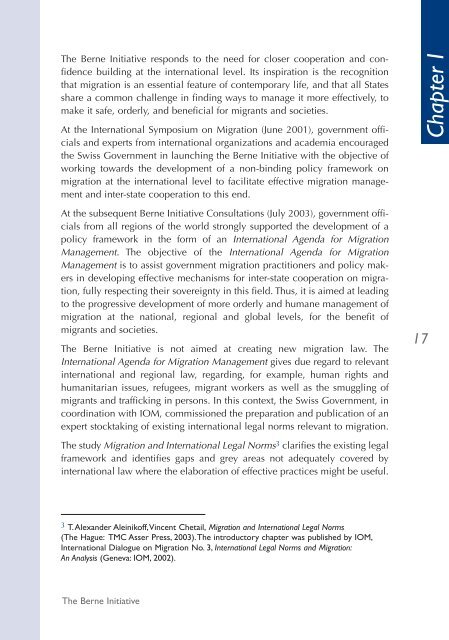Chapitre III - UNITAR
Chapitre III - UNITAR
Chapitre III - UNITAR
You also want an ePaper? Increase the reach of your titles
YUMPU automatically turns print PDFs into web optimized ePapers that Google loves.
The Berne Initiative responds to the need for closer cooperation and confidence<br />
building at the international level. Its inspiration is the recognition<br />
that migration is an essential feature of contemporary life, and that all States<br />
share a common challenge in finding ways to manage it more effectively, to<br />
make it safe, orderly, and beneficial for migrants and societies.<br />
At the International Symposium on Migration (June 2001), government officials<br />
and experts from international organizations and academia encouraged<br />
the Swiss Government in launching the Berne Initiative with the objective of<br />
working towards the development of a non-binding policy framework on<br />
migration at the international level to facilitate effective migration management<br />
and inter-state cooperation to this end.<br />
At the subsequent Berne Initiative Consultations (July 2003), government officials<br />
from all regions of the world strongly supported the development of a<br />
policy framework in the form of an International Agenda for Migration<br />
Management. The objective of the International Agenda for Migration<br />
Management is to assist government migration practitioners and policy makers<br />
in developing effective mechanisms for inter-state cooperation on migration,<br />
fully respecting their sovereignty in this field. Thus, it is aimed at leading<br />
to the progressive development of more orderly and humane management of<br />
migration at the national, regional and global levels, for the benefit of<br />
migrants and societies.<br />
The Berne Initiative is not aimed at creating new migration law. The<br />
International Agenda for Migration Management gives due regard to relevant<br />
international and regional law, regarding, for example, human rights and<br />
humanitarian issues, refugees, migrant workers as well as the smuggling of<br />
migrants and trafficking in persons. In this context, the Swiss Government, in<br />
coordination with IOM, commissioned the preparation and publication of an<br />
expert stocktaking of existing international legal norms relevant to migration.<br />
The study Migration and International Legal Norms 3 clarifies the existing legal<br />
framework and identifies gaps and grey areas not adequately covered by<br />
international law where the elaboration of effective practices might be useful.<br />
3 T.Alexander Aleinikoff,Vincent Chetail, Migration and International Legal Norms<br />
(The Hague: TMC Asser Press, 2003).The introductory chapter was published by IOM,<br />
International Dialogue on Migration No. 3, International Legal Norms and Migration:<br />
An Analysis (Geneva: IOM, 2002).<br />
The Berne Initiative<br />
Chapter I<br />
17
















